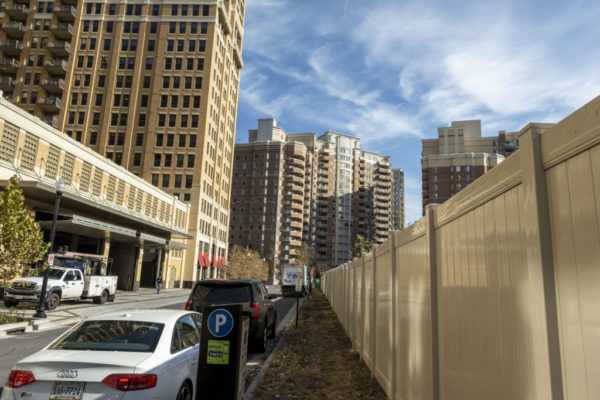
Next month, Arlington County will hold a community event to kick off a three-year parking pilot program that prices parking by demand in a few highly trafficked corridors.
This is the first official step forward since the Arlington County Board accepted a $5.4 million grant from the Virginia Dept. of Transportation for the “performance parking” program.
The pilot would electronically monitor parking space usage alter parking prices based on the day, time and the number of people competing for a metered parking space along the Rosslyn-Ballston and Crystal City-Pentagon City corridors. It would also give drivers real-time information on spot availability and price.
In the meeting description, Arlington County says the three-year pilot project could “improve the user experience for metered parking spaces in two key commercial and residential corridors in Arlington.”
“Join the project team for a Community Kick-Off meeting to learn more about the pilot project, the technology we’ll be using to inform the project, and share your input on the pilot project’s goals to help us understand your priorities for metered parking spaces in the Rosslyn-Ballston and Route 1 corridors,” per the website.
According to the event page, meeting attendees will be able to:
- Learn about the pilot’s background and purpose
- Get briefed on the status of metered parking in the two Metrorail corridors
- Learn what technology will be used and what data will be collected, and how this will inform the project’s next steps
- Get a first look at a demonstration site
Arlington County Board members approved the program in late 2020 after hashing out concerns from some opponents about how this would impact people with lower incomes. Members were convinced by the case staff made that lower-income people are less likely to have one or more cars and could save money on parking by choosing to park on less-popular streets and for shorter time periods.
Ultimately, however, the pilot project is intended to sort out these concerns and “map out any mitigations that are necessary,” parking planner Stephen Crim said at the time.
Project proponent Chris Slatt said at the time that variable-price parking ensures that spots are generally available where and when people want them. He pointed to the city of San Francisco, which found that the program made it easier for people to find parking. This reduced double parking, improved congestion and lowered greenhouse gas emissions.
An online Q&A about the project lists as goals, “Drivers spend less time looking for on-street parking” and “Vehicle miles travelled resulting from on-street parking search or ‘cruising’ are reduced.” That will come at a cost, though, as parking rates are increased in busy areas.
The virtual community kick-off meeting will be held Thursday, Feb. 23 from 7-8:30 p.m.

